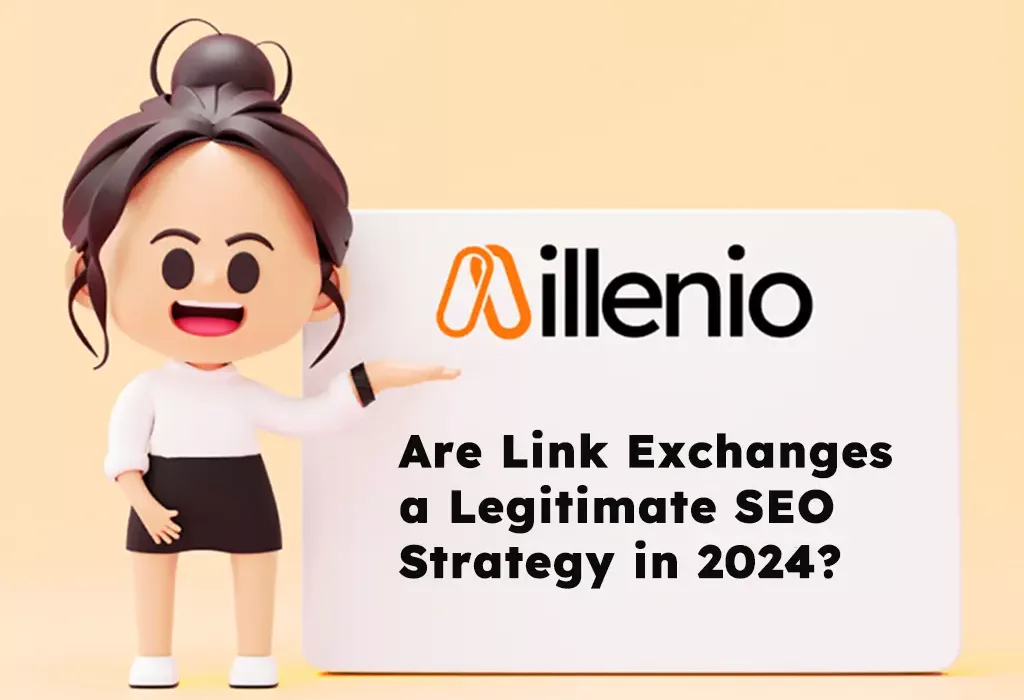by Liam Cook
October 19, 2023
0

Link exchange, or reciprocal linking, is where two websites agree to link. This practice emerged from the concept that links are a form of online “votes” for your site. The more links you have, especially from reputable sites, the more valuable your website appears to search engines.
In the early days of SEO, this was a straightforward numbers game. The more links you had, the higher your search engine ranking. It has led to a proliferation of link exchanges, with websites often exchanging links without regard for relevance or quality.
However, over time, search engines became more sophisticated. Google, in particular, started to crack down on what it considered ‘link schemes’ — tactics that attempt to manipulate a site’s ranking in Google search results. Includes excessive link exchanges, especially when the links are irrelevant or do not add value to the users.
As a result, the way link exchanges affect SEO has changed. While not inherently wrong or illegitimate, they must be approached with care in 2024.
The Evolution of Link Exchanges
When Google launched its revolutionary PageRank algorithm in the late 90s, the number and quality of inbound links to a website became a critical factor in its search engine ranking—led to a proliferation of link exchanges, where two websites would agree to link to each other to improve their respective SEO.
However, as the internet grew and SEO practices evolved, Google updated its algorithms to prioritise quality content and penalise manipulative link schemes, including excessive link exchanges. The emphasis shifted from quantity to quality, with high-value, relevant links carrying more weight than numerous low-quality ones.F

Fast forward to 2024, and you might wonder whether link exchanges have become obsolete. They are certainly not as prevalent or straightforward as once, but they are not entirely irrelevant either.
The critical distinction today is between natural and unnatural link exchanges. The latter, which involve unrelated websites or excessive, unearned linking, are likely to be penalised by search engines. The former, where relevant websites link to each other because their content is mutually beneficial, can still contribute to improved SEO.
In 2024, the link exchange strategy that proves effective emphasises high-quality, relevant links. It’s not about trading links with any website willing to reciprocate but about establishing beneficial partnerships with websites that offer complementary content.
Take, for instance, a blog about vegan recipes and a vegan supplement online store. A link exchange between these two websites would make sense because their content is mutually relevant, providing added value to their respective audiences.
This thoughtful, high-quality link exchange differs significantly from the indiscriminate link swapping of the past and is more likely to boost your SEO. You can see more examples of this in action at Millenio, a digital agency that has mastered this SEO strategy.
The key to successful link exchanges in 2024 is carefully evaluating potential partnerships. Before agreeing to a link exchange, consider the following:
Relevance: Is the other website’s content relevant to yours? Do they target a similar audience?
Quality: Does the other website produce high-quality content? Do they have a strong domain authority?
Value: Can you offer genuine value to the other website’s audience and vice versa?
A link exchange that ticks all these boxes will likely be a mutually beneficial arrangement that improves your SEO while providing value to both websites’ audiences

While link exchanges can still play a role in your SEO strategy in 2024, they should not be the sole focus. They are one tool among many, and their effectiveness will be limited if not backed by a robust, holistic SEO strategy.
In addition to link exchanges, you should focus on producing high-quality, unique content, optimising your website for mobile, improving your website’s loading speed, and using relevant keywords strategically.
Social media promotion, guest blogging, and influencer marketing are other effective ways of increasing high-quality inbound links to your website. You can explore all of these strategies in-depth on websites like Millenio.
So, are link exchanges a legitimate SEO strategy in 2024? The answer is yes, but they are not the be-all and end-all of SEO. They must be approached thoughtfully and responsibly, focusing on quality, relevance, and value rather than quantity.
As the SEO landscape evolves, staying up-to-date with the latest trends and best practices is essential. Link exchanges are part of this picture but should be just one component of your broader SEO toolkit.
One key point to remember when considering link exchanges is their impact on the user experience. If a link exchange makes sense from a user perspective — for instance, if the linked content provides additional relevant information — it can be a valuable addition to your site. However, if link exchanges are forced or unnatural, they can negatively impact the user experience, leading to lower site engagement and ultimately harming your SEO.
Establishing link exchanges can also contribute to your SEO strategy by fostering relationships within your industry. Outreach efforts to identify link exchange opportunities can lead to collaborations, partnerships, or guest blogging opportunities, improving your site’s visibility and credibility.
That said, it’s essential to understand the risks associated with link exchanges. Google explicitly states in its Webmaster Guidelines that excessive link exchanges (“Link to me and I’ll link to you”) can negatively impact a site’s ranking in search results. This is part of “link schemes,” violating Google’s guidelines. Therefore, when conducting link exchanges, they should be done sparingly and with discretion.
Link exchanges with reputable, high-authority sites can also boost your site’s trust in search engines. Trust is critical in SEO; search engines aim to provide users with trustworthy and reliable content. When high-authority sites link to your website, it signals to search engines that your content is credible and reliable.
While link exchanges can be part of an SEO strategy, organic link building is still the most beneficial. It involves creating high-quality, unique content that others naturally want to link to. When your content is linked organically, it carries more weight than a link obtained through a link exchange.

It’s also essential to differentiate link exchanges from paid links. Paid links, where you spend another website to link to your site, are against Google’s guidelines and can result in penalties. On the other hand, link exchanges are generally not paid and, therefore, not against Google’s rules, as long as they aren’t conducted excessively and don’t appear manipulative.
Link exchanges should also be done with the relevancy and quality of the content in mind. Linking to a website with irrelevant or low-quality content can harm your SEO, even if that website has a high domain authority. Conversely, linking to a relevant, high-quality website, even one with a lower domain authority, can benefit your SEO.
Link exchanges can also be particularly beneficial for local SEO. Exchanging links with local businesses or organisations can help improve your visibility in local search results. It is helpful for small businesses looking to increase their local presence.
Lastly, it’s essential to monitor your links regularly. If a site you’ve exchanged links with drastically quality drops, or if the link breaks, it could negatively impact your SEO. Regularly monitoring your links ensures that all your inbound and outbound links work correctly and still benefit your SEO.
Link exchanges can also tie into your social media strategy. Re-exchanging links with a site with a solid social media presence can boost your visibility on these platforms. Similarly, promoting content on your social media that includes links to other relevant websites can increase the likelihood of reciprocal linking.

The evolution of AI and machine learning makes search engines more intelligent and more capable of distinguishing between legitimate and manipulative link exchanges. Search engines can now better understand the context and relevance of the content around the link, making quality content and relevant link exchanges even more critical.
Ethics is another consideration when it comes to link exchanges. The SEO community continuously debates the ethical implications of various SEO strategies, including link exchanges. The consensus is that as long as link exchanges are conducted transparently and ethically and provide value to the user, they are a legitimate SEO strategy.
Voice search is another growing trend that impacts SEO. While less directly related to link exchanges, ensuring your site is optimised for voice search can help improve your overall SEO. If your site is well-optimised and has a broad network of high-quality links, it will likely be returned as a voice search result.
Monitoring your SEO metrics is also crucial when conducting link exchanges. Keep an eye on your referral traffic, bounce rate, and time on the page, among other metrics. These can provide insight into how your audience responds to your linked content and help you adjust your link exchange strategy as needed.
Another crucial aspect of SEO in 2024 is website accessibility. Search engines are increasingly prioritising websites that are accessible to all users, including those with disabilities. While this isn’t directly tied to link exchanges, ensuring that your website is accessible can improve your overall SEO and, in turn, the effectiveness of your link exchanges.
While link exchanges can help build your link profile, it’s also essential to diversify your inbound links. Includes a mix of do-follow and no-follow links, links from various domains, and links to different parts of your website. A diversified link profile is seen as more natural and is less likely to be penalised by search engines.

For e-commerce websites, link exchanges can be particularly beneficial. They can help drive traffic, boost product visibility, and increase sales. For instance, a link exchange with a product review blog or a related product provider could be profitable.
Lastly, it’s important to remember that mobile optimisation is crucial for SEO in 2024. More people are searching on mobile devices than ever, and search engines prioritise mobile-optimised sites. While this doesn’t directly impact link exchanges, having a mobile-optimised place will make your link exchanges more effective by ensuring a positive user experience.
Google’s Core Web Vitals, which measure user experience metrics like load time, interactivity, and visual stability, also play a significant role in 2024’s SEO. While not directly related to link exchanges, a website with good Core Web Vitals scores can be more appealing for link exchange opportunities. It also stands a higher chance of better search engine rankings.
Link exchanges can also be used as a form of competitive analysis. By observing the linking practices of your competitors, you can gain insight into their SEO strategies and identify areas for improvement in your strategy. This analysis might help you find potential link exchange partners within your industry.
It’s important to remember that while link exchanges can boost your SEO short term, they are not a magic bullet for long-term success. Achieving and maintaining high search engine rankings requires ongoing effort, regular content updates, and continuous SEO optimisation. Link exchanges are one piece of this puzzle but must be part of a long-term strategy.
Link exchanges also fit into the broader context of content marketing. A strong content marketing strategy, which involves creating and sharing valuable content to attract and engage a clearly defined audience, naturally lends itself to beneficial link exchanges—creating high-quality content that others want to link to increases the likelihood of fruitful link exchanges.
So, are link exchanges a legitimate SEO strategy in 2024? The answer is yes, but they are not the be-all and end-all of SEO. They must be approached thoughtfully and responsibly, focusing on quality, relevance, and value rather than quantity.
As the SEO landscape evolves, staying up-to-date with the latest trends and best practices is essential. Link exchanges are part of this picture but should be just one component of your broader SEO toolkit.
Always remember that SEO’s ultimate goal is to rank highly in search engine results and deliver the best possible experience to your audience. If you keep this in mind, you’ll be on the right path to success, regardless of what changes the future brings to the SEO world. Visit Millenio to keep yourself updated with the latest trends and techniques in SEO.

